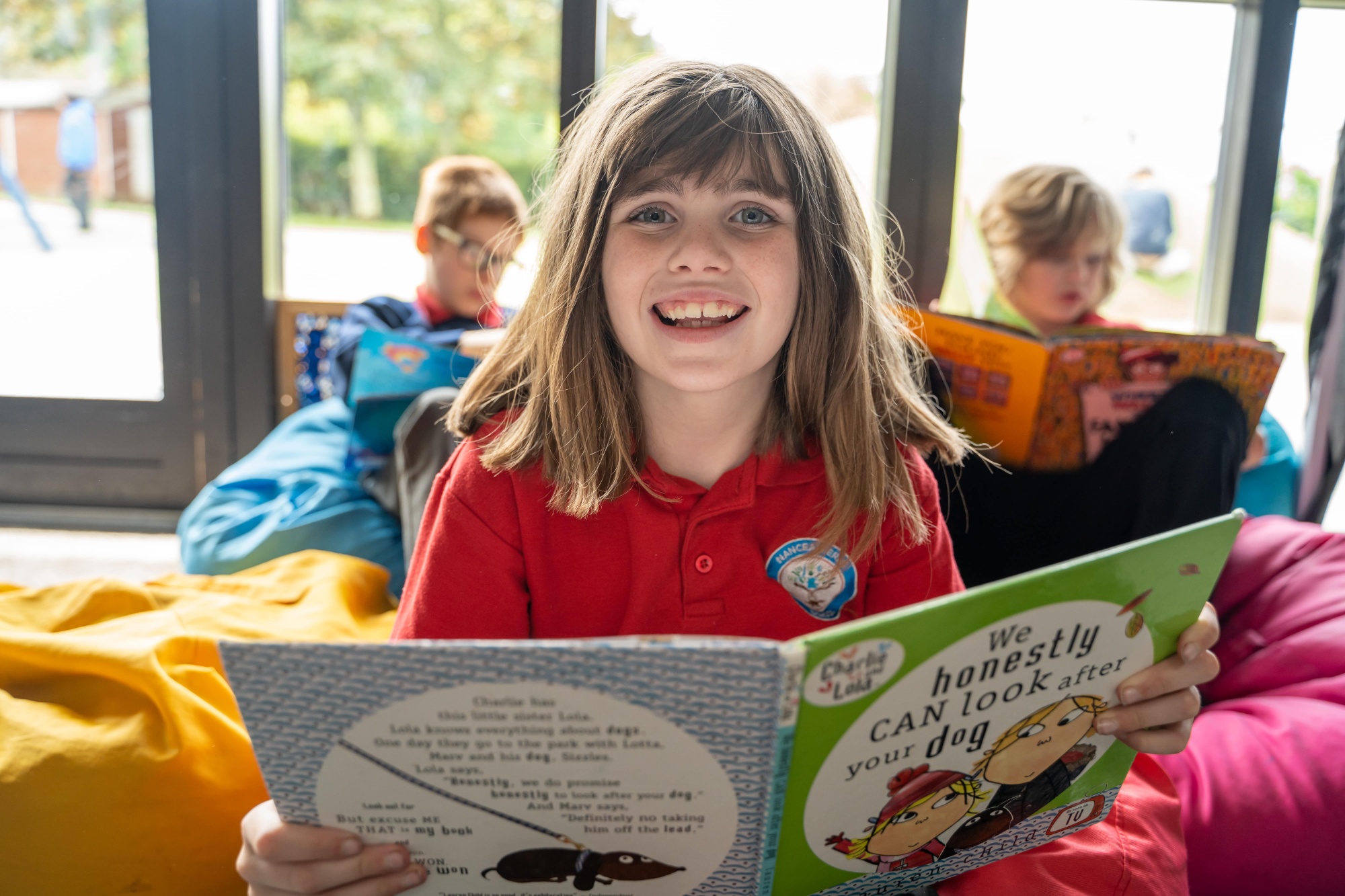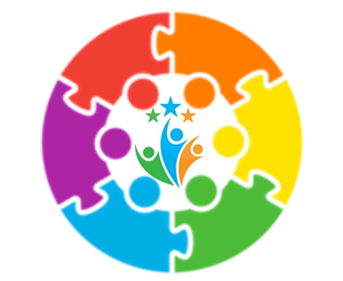Core- English
How do we prioritise reading?
- Each of our classrooms has a cosy and comfortable reading corner or area where pupils can sit during the day to read a book.
- Books are rotated regularly by staff and students to match the class topic, new sounds and vocabulary and pupils’ interests.
- We have recently refurbished our library area and used student and staff to help to design, choose furniture and decoration and books. We now also have a new reading room/snug-which acts as an absolute quiet haven for students to curl up with a good book.
- We endeavour to use books and high-quality texts to enrich the learning and provide access to a range of genres and text types.
- To encourage reading at home, we use Class Dojo to promote reading and reward Dojo points for each time a child reads. We also use reading journals for parents and carers to track the reading at home-this works as a great tool to monitor pupils not reading at home, so we can provide extra provision in school.
- We have a termly ‘Reading Newsletter’ which covers the highlights of reading that term, contains brilliant book recommendations and covers top tips on how to keep the children enjoying reading over the holidays.
- Reading is celebrated in our school celebration assembly each week, with pupils being awarded ‘Reading Star of the week’
- We hold reading events throughout the year such as Drop and Reads, Story-telling, Stories from other Cultures, Author Days and World Book Day.
- We hold mixed class phonics and reading sessions 4X a week when small focused groups of similar ability children access either sensory phonics-phase 1-6 phonics sessions-with the Twinkl Phonics programme techniques, whole word, SPAG, comprehension and guided reading sessions.
- Children are assessed termly using the Twinkl phonics assessments and Phase 1-6 student assessments to ensure they are grouped according to their ability.
- Staff are trained and supported to deliver high quality sessions and to monitor the progress of the group they are teaching. Whole School Twinkl phonics CPD delivered to all staff.
- Early reading is encouraged by providing pupils with non-worded reading books in the first instance. Once they have developed their phonics and decoding skills, they are then moved on to texts that match their phonic ability and are fully decodable.
- Pupils who are learning to read through Phonics take home 2 books, a book from one of reading schemes which aligns to the Twinkl phase they are studying in school to ‘Showcase’ and practise their reading and a book of their choice and interest.
- Every student has a daily reading session timetabled once a day across the school.
- Children who have completed and are beyond the Twinkl Phonics phases take part in small Guided Reading sessions where high quality texts are at the heart of learning.
- Reading skills are developed through the use of our school Reading Dogs and ‘VIPERS – reading questions.
- All children have regular access to the school library every day
How do we promote a love of reading?
- All staff are passionate readers, we even have a staff book club called the 'Nancealverne Bookworms' where we can read and discuss books for fun.
- Teacher share amazing children’s literature together at teacher and key-stage meetings and plan ideas on how we can deliver these beautiful books to our students.
- Teachers read class stories which inspire them to promote a love and enjoyment of stories, immersing them and the classroom into the world of imagination.
- Our learning opportunities incorporate a range of fiction, non-fiction, and poetry, to expose pupils to different texts they may enjoy.
- Whole class reading sessions allow time for pupils to discuss their reading, and be heard reading by an adult helping them to make sense of what they have read.
- Pupils are encouraged to access the library and change books on a daily basis. This is in addition to their levelled reading book from our reading zone.
- We encourage pupils in each class to share their love of reading by inviting them to read to younger classes and recommend reads in the library.
- For World Book Day we often set up mixed age reading buddies, have author visits and ask staff to share their favourite books.
- We have 'Drop and Read' hours when we collapse the curriculum to focus on the love of reading. We have storytelling afternoons.
How do we make sure pupil's make progress?
- Phonics is taught following the Twinkl Phonics Phase 1-6 progression of sounds to ensure a systematic approach. These lessons and resources have linked readers with the student’s current sound. Phonics lessons follow the same sequence of revise, teach, practise, apply and review.
- Planning includes assessment checkpoints for the graphemes taught. Phonics is assessed termly to identify gaps in learning to inform further planning, intervention and future set changes.
- Each class has dedicated timetabled daily class reading sessions. The sessions are well-structured and provide opportunity for pupils to read independently, as part of a group, develop comprehension skills, discuss key features and elements of the text and express likes and dislikes linked to the text.
- The school supports pupils to be expert readers by developing the key skills of developing vocabulary, making inferences, predicting, retrieval, summarising, commenting and looking at the author.
- Pupils who are struggling with decoding skills receive targeted support.
- Pupils who need further opportunity to practise reading because they do not read at home or are within the lowest 20% within the class are given priority to read to an adult in school and have extra reading tasks in morning table activities.
- Class teachers ensure volunteers, who come into school to hear readers, are trained to support reading appropriately.
- Staff have pupil progress meetings and the Reading Lead completes pupil and staff conferencing in reading.
- Children are encouraged to re-read their book a minimum of twice to develop reading fluency.
- We assist parents with supporting reading by providing parents meetings, reading information meetings, information on the school website, Reading Newsletters and letters home.
How do we teach phonics from the start?
Phonics teaching begins with our youngest pupils from the time they join us in Acorns where there is a real focus on speaking and listening and developing children’s ability to hear sounds around them. This is often done through games, nursery rhymes and rhyming activities.
- Pupils begin learning letter sounds on entry to Reception. Following the Twinkl Phase 1-6 system pupils are immersed in a directed teaching approach which embeds systematic phonics skills as the core skills for reading.
- We use the Twinkl phonics as our main programme and structure for our Primary phonics sessions as its vast range of interactive, engaging and differentiated resources works so well for so many of our learners. We follow the systematic phases 1-6 to work through the sounds, assessment and tracking of reading progress. The Twinkl reading programme has levelled reading books called Rhino readers to support the progress of students, but the other reading scheme books such as the Oxford Learning Tree and Read Write Inc readers also align to the programme. We also use See and Learn apps and Reading Eggs to help to successfully meet the needs of all children.
- Access to Reading Eggs- a phonics app we have also invested in to help to close the gaps in reading that may have occurred in lock down and the pandemic and the children use the school laptops to access this brilliant programme at school on a daily/ weekly basis and can also access the programme with their home logins at home.
- Sounds are taught in a specific order- Phases 1-6 and regular assessment informs future planning and targeted support.
• Phonics is discussed with parents in parent’s meetings and parents are given resources such as a sound mat, sound cards recommended apps to support phonics at home.
• When Reception pupils have started school another meeting and literature on supporting phonics and reading is provided for parents.
• All children will be taught a new sound each week and revise previously taught sounds.
First, pupils will learn:
Phase 1- is exploring the alphabet through Sensory activities whilst covering the following 7 sound aspects:
- Sound Discrimination- Environmental Sounds
- Sound Discrimination- Instrumental sounds
- Body Percussion
- Rhythm and Rhyme
- Alliteration
- Voice sounds
- Oral blending and Segmenting
Second, we will learn to read:
Phase 2 sounds
Words containing these sounds.
s, a, t, p, i, n,
m, d, g, o, c, k
e, u, r, h, b, f,
l, ck, ss, ll, ff
Third, we will learn to read:
Phase 3 sounds:
j, v, w, x, y, z, zz,
qu, ch, sh, th, th, ng
ai, ee, igh, oa, oo,
oo, ar, or, ur, ow, oi,
ear, air, ure, er
Fourth, we learn to read
Phase 4 initial sounds and blends:
Sk, lt, lp, if, and pt
Scr, shr, thr, nch and str
Fr, nl, fl, gl and pl
Cl, sl, sp, st and tw
Sm, pr, sc, sk and sn
Fifth we learn Phase 5 sounds:
ay; ou; ie; ea; oy; ir; ue; aw; wh; ph; ew; oe; au;
They will also learn split digraphs:
a-e; e-e; i-e; o-e; u-e
Finally Phase 6:
Is whole word reading, free readers- guided reading, spelling, grammar and punctuation.
They will also learn, among other things:
Prefixes and suffixes, e.g. ‘in-’ and ‘-ed’
The past tense
Memory strategies for high frequency or topic words
Proof-reading
How to use a dictionary
Where to put the apostrophe in words like ‘I’m’
Spelling rules
How do we support pupils to catch-up?
• Progress is assessed termly and pupil progress analysis is taken from this. Pupils identified by class teachers and in pupil progress meetings as not making progress have targeted support planned for them and teaching staff are aware of who is a priority for additional support.
• Formative data, BSquared targets, Personal Learning Goals (PLGs) and EHCP targets, informs day-to-day planning and teachers adapt and change this according to the pupil needs.
• Class teachers are in regular communication with parents regarding how to support their child with their reading.
How do we support staff to become reading experts?
- Teaching staff, including Teaching Assistants receive reading and phonics training, refreshers and updates as and when required. This may be a specific focus on the SDP or a personal target identified in performance management or specific training identified by staff. This may include in-house training or external training depending on the needs of the staff.
- Whole school CPD and phonics training and updates.
- Yearly questionnaires and audits of whole school competence and confidence of phonics delivery is collected to identify which staff teams and individual staff members need which training and informs and shapes our yearly CPD and INSET focus.
- The Senior Leadership Team, School Improvement Partner and subject leads monitor phonics and whole class reading sessions and conduct subject learning walks, observations, book looks, pupil and staff conferencing to ensure agreed approaches and consistency are applied across the school.
- The reading lead monitors reading and offers guidance to staff with follow-up actions and support plans when needed.








